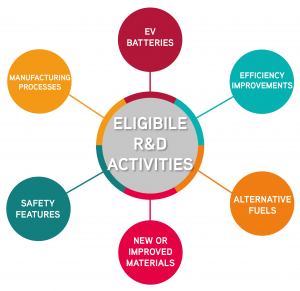

Can the automotive sector claim R&D Tax Credits?
Many automotive companies conduct research and development to develop new and improve existing technology to be used in the production of vehicles. Whether it is to make new materials and parts, improve manufacturing processes – making them automated or reducing wastage/costs – or developing brand new electric vehicle concepts.
In today’s automotive industry, many OEM’s will conduct lots of R&D of their own, but a vast amount will be carried out by their respective supply chains. Companies developing components for the automotive sector are in a prime position to claim R&D Tax Credits for their efforts.
The question that we are always asked is ‘what activities qualify for claiming R&D Tax Credits?’
Here are some examples…

These examples are certainly not an exhaustive list but it demonstrates the broad range of developments that could mean that your company is eligible to claim R&D Tax Credits.
As long as the R&D being done is to overcome a technical or scientific uncertainty, then it could be eligible!
Our Consultants are experts in delving deep into your projects, to identify all of the eligible R&D activities and ensuring your claim is maximised to it’s fullest potential.

In previous years, our clients within the automotive sector have been able to claim back, on average, £37,500 in R&D Tax Relief from HMRC!
Your business could be eligible to claim R&D Tax Credits whether it is an SME or Large Enterprise and a claim can still be made if you are loss-making, if the project did not deliver the desired end-results and if the project was grant funded.
Still not sure?
You can find out more about the 2 R&D Tax Credit schemes by visiting our R&D Tax web-page.
Get in touch and our R&D Tax Credit Consultants can decipher from a FREE quick telephone consultation, whether the activities being undertaken are eligible and let you know exactly which project costs can be claimed back on.
Our comprehensive 2025 R&D Tax Credits review covers everything businesses need to know, including key developments in R&D tax reliefs, claim trends, compliance updates, HMRC enforcement actions, First Tier Tribunal cases, and changes to schemes like RDEC, ERIS, and Advance Clearance. Explore the impact on SMEs and large companies, insights on eligible costs and foreign subcontractor rules, and what to expect for R&D tax credits in 2026.

An HMRC R&D compliance check can be intimidating, even for businesses doing genuine innovation. This article walks you through what happens during a check, the information HMRC typically asks for, common issues that can arise, and how TBAT Innovation helps businesses respond confidently and keep their R&D tax credit claims strong.

Assists organisations in accessing research and development grant funding across a range of UK and EU schemes and industry sectors.
Get In Touch